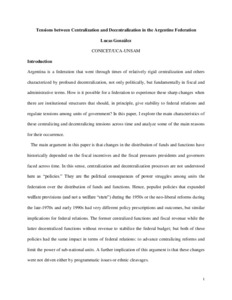Please use this identifier to cite or link to this item:
https://repositorio.uca.edu.ar/handle/123456789/17085| Título: | Tensions between centralization and decentralization in the argentine federation | Autor: | González, Lucas Isaac | Palabras clave: | CENTRALIZACION; DESCENTRALIZACION; FINANZAS; POLITICA; FEDERALISMO ARGENTINO; RELACIONES POLITICAS; DISTRIBUCIÓN DE LA RIQUEZA | Fecha de publicación: | 2013 | Editorial: | Routledge | Cita: | González, L. I. Tensions between centralization and decentralization in the argentine federation [en línea]. En: Loughlin, B., Kincaid, J., Swenden, W. (eds.) Routledge Handbook of Regionalism & Federalism. London : Routledge, 2013. Disponible en: https://repositorio.uca.edu.ar/handle/123456789/17085 | Resumen: | Abstract: Argentina is a federation that went through times of relatively rigid centralization and others characterized by profound decentralization, not only politically, but fundamentally in fiscal and administrative terms. How is it possible for a federation to experience these sharp changes when there are institutional structures that should, in principle, give stability to federal relations and regulate tensions among units of government? In this paper, I explore the main characteristics of these centralizing and decentralizing tensions across time and analyze some of the main reasons for their occurrence. The main argument in this paper is that changes in the distribution of funds and functions have historically depended on the fiscal incentives and the fiscal pressures presidents and governors faced across time. In this sense, centralization and decentralization processes are not understood here as “policies.” They are the political consequences of power struggles among units the federation over the distribution of funds and functions. Hence, populist policies that expanded welfare provisions (and not a welfare “state”) during the 1950s or the neo-liberal reforms during the late-1970s and early 1990s had very different policy prescriptions and outcomes, but similar implications for federal relations. The former centralized functions and fiscal revenue while the latter decentralized functions without revenue to stabilize the federal budget; but both of these policies had the same impact in terms of federal relations: to advance centralizing reforms and limit the power of sub-national units. A further implication of this argument is that these changes were not driven either by programmatic issues or ethnic cleavages. | Cobertura Espacial: | Argentina | URI: | https://repositorio.uca.edu.ar/handle/123456789/17085 | Disciplina: | CIENCIA POLITICA | Derechos: | Acceso abierto | Fuente: | Loughlin, B., Kincaid, J., Swenden, W. (eds.) Routledge Handbook of Regionalism & Federalism. London : Routledge, 2013. |
| Appears in Collections: | Artículos |
Files in This Item:
| File | Description | Size | Format | |
|---|---|---|---|---|
| tensions-between-centralization.pdf | 172,93 kB | Adobe PDF |  View/Open |
Page view(s)
44
checked on Apr 27, 2024
Download(s)
36
checked on Apr 27, 2024
Google ScholarTM
Check
This item is licensed under a Creative Commons License

